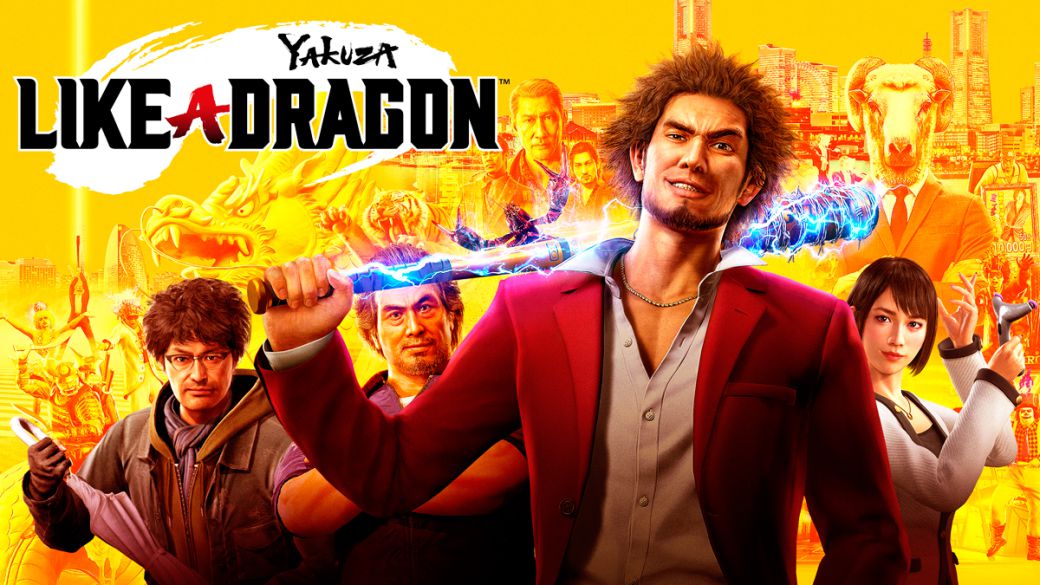
The turn-based battles and the new cast of protagonists are two relevant changes that work. A game of height.
In the year 2016 the great plot of Kazuma Kiryu and Haruka Saramura came to an end (although we would have to wait until 2018). It was the end of an odyssey that had started a little over a decade earlier and that became one of the great bastions of today’s Sega. It is curious that, at first, the company did not want to bet on that Toshihiro Nagoshi project, considering it to be a very niche market and calculating quite low sales even in Japan. Not surprisingly, at that time in 2004 Sega had still just become a third party and the high debts led to that famous merger with Sammy. Precisely, it would be the founder of this company who would fall in love with the project and insist that it go ahead.
The new Sega Sammy started on the top with a great success, since the sales estimates were just 70,000 copies and ended up exceeding one million copies sold. The overwhelming success (especially in Japan, being such titles of Japanese idiosyncrasy) would encourage Sega and the development team itself to continue betting on it to the point of turning it into an annual franchise. During his fifteen years of life, we have lived seven chapters of the story of Kazuma Kiryu, two spin-offs set at different moments in the history of Japan, two installments with a different character for PSP, an alternate universe with a zombie holocaust, two large-scale remakes of the first installments, an online game and a spin-off set in the same universe but not directly related to the usual protagonists (Judgment).
When Judgment came out, two years after Yakuza 6 (the last chapter of the main plot), it seemed that the bet of the Ryu ga Gotoku Studio (which was named in honor of the name of the franchise in Japan) was going to be to tell us other stories from Kamurocho, the fictional neighborhood in which the story is based (although it is based on the Kabukicho location in Shinjuku). However, he surprised us all with a new numbered installment that would break with the foundations established by the previous ones: new characters, new locations (although some already known ones are visited) and a new game system. In the West, it would lose 7 to the detriment of the Like a Dragon subtitle, which would be the translation of Ryu ga Gotoku, the title of the series in its country of origin.
Yakuza: Like a Dragon is a game that wants to shine on its own and make it clear that there is life beyond Kiryu and company. The truth is that, during the first hours of this new adventure, everything gives you the feeling of being more of a spin-off and not so much a direct continuation as it is supposed to be, but when you want to realize it, the game has already in love as much as the previous installments and once again makes clear the excellent good work of a Ryu ga Gotoku studio that continues to maintain a very high level in its productions despite releasing a game every year.
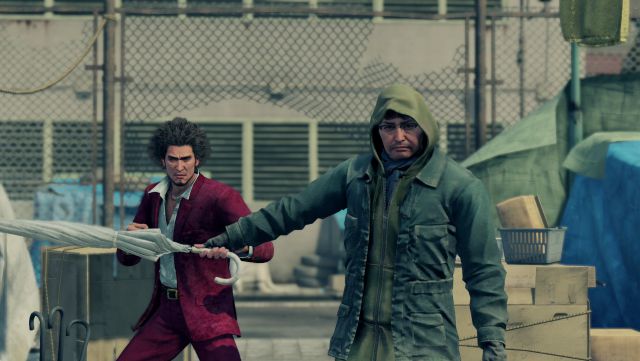
Ichiban Kasuga, the antithesis of Kiryu
There are few interviews in which Masayoshi Yokoyama, the scriptwriter of the franchise, comments that the new main character, Ichiban Kasuga, had been as good as Kiryu and that his adventures could be on the level of those of the already legendary character. Of course, they do not try to hide the opposition that he supposes with respect to the previous hero: Kiryu was a serious person, he had well slicked hair and wore a red shirt under a gray suit, while Kasuga is much more direct and casual, he wears a perm. quirky (she has her own in-game explanation) and wears a grayish-white shirt under a red suit. But beyond their aspect of direct opposites, there is something in which they are very similar: their unmatched charisma.
Unlike Kiryu, whose story is being told to us in a slightly more disorderly way (Yakuza 0, which would be the first chronologically, came out after Yakuza 5), we know about Kasuga from his earliest childhood and we live it in a much more direct. It is something necessary to understand the basic plot that makes sense of everything: when he was a baby he was abandoned in a lockers at Shinuki station, since his parents belonged to the Arakawa family and they wanted to keep him safe from harm due to the his parents’ business problems. He would end up being welcomed by Jiro Kasuga, the owner of a soapland (a kind of brothel in which customers can be bathed by the girls or bathe them).
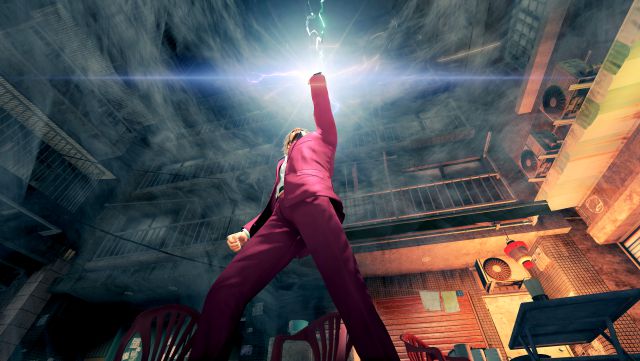
In that place he lived surrounded by poverty and used to living with the minimum, while he saw how the people around him were considered history by the rest of society. In his attempt to survive, he disconnected from the world in the back room of the soapland, where he spent day and night playing Dragon Quest and dreaming of one day being a hero. When he reached adolescence, he dropped out of school and started doing whatever it took to get money, which led him to fight other people with some assiduity. The problem was when he took it with some yakuza and, in an attempt to intimidate them, I tell them that he was part of the Arakawa family, whom he really did not know at all. It turned out that the yakuza were precisely the enemies of the Arakawa and that made matters worse.
Said yakuza would call the family leader to go pick up his bully and, to Kasuga’s surprise, Arakawa appeared and made a sacrifice to pay for the mistakes of our protagonist. After that, and after giving him the correct correction for what he had forced him to do, Arakawa accepted Kasuga into his family and set out to teach him to be a real yakuza and not just to pretend that he was one. After a few years, with a Kasuga completely surrendered to his yakuza family, Arakawa tells him that another person from the clan had murdered a member of another family and asks him to bear the blame. Kasuga accepts a thousand loves, since he sees it as the opportunity to return the favor of everything he had done for him. This is how he spent almost two decades in jail.
When leaving, Kasuga finds a world very different from the one he knew. At 42, technological advances catch him new and, above all, he finds that the world he knew and for which he gave his life has disappeared, with his former mentor denying him. The very reality of having made a sacrifice in vain and having spent almost half of his life in prison for it causes him to become a person in a no-man’s-land in a polarized society. Where everything is black or white, he turns into a despised gray that nobody wants to give a chance to. And that is one of the main points of interest of the game’s plot, that the heroes are not the usual young people with hidden powers of the Japanese role, but we have a group of middle-aged people who want to find their place again in a society that has repudiated them.
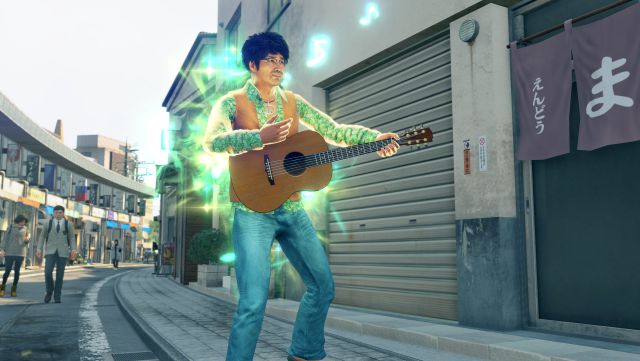
As is customary in the franchise, the plot unfolds on several fronts. There is a great main plot, worthy of the best films of yakuza cinema, that unites all the characters, but we will also delve into the motivations and the past of each of them separately. There is no shortage of dozens of common secondary stories and, in addition, we also have other subplots in the form of attached minigames that will give us more information about the main characters and present other social criticisms in different areas (such as business management or kart competitions ). The numerous video sequences and the huge amount of dialogues will invite us to immerse ourselves deeply in the universe of the game, to know in depth every detail and to become fond of various corners and inhabitants of the new environment of Isezaki Ijincho (which is based on this occasion on Isezakicho district, Yokohama).
In summary, at the narrative level, it follows the trail to which the franchise has accustomed us and takes the opportunity to criticize many problems in Japanese society. The characters are all very interesting and have a very deep development, even quite a few secondary characters end up being more elaborate than expected. It is difficult to maintain the narrative level as the Ryu ga Gotoku Studio does, so it is worthy of praise that they have managed to prevent us from missing the characters we have been familiar with for so many years (although there are several pleasant surprises in this regard) . Of course, the rhythm is a little more irregular than in other deliveries. The game begins with four chapters loaded with video sequences and staging before drastically stopping the main plot for several chapters focused more on the open world and experimenting as Ichiban and company try to rebuild their lives.
However, little by little he will recover his rhythm and will end up taking us to the usual final stretch of heart attack. There is also a controversial point in this aspect, which has dragged on from previous deliveries: the representation of the world of the Japanese mafia and its inexorable sexist vision. The developers are aware of this in all the installments and there is abundant criticism of machismo and countless dialogues that make us think of ways to improve the situation, but a more direct impulse in this aspect would not hurt, since sometimes there is You have to scratch a bit to get to that deliberate criticism. Fortunately, even if they are few, the female characters in the game are quite interesting and well developed.
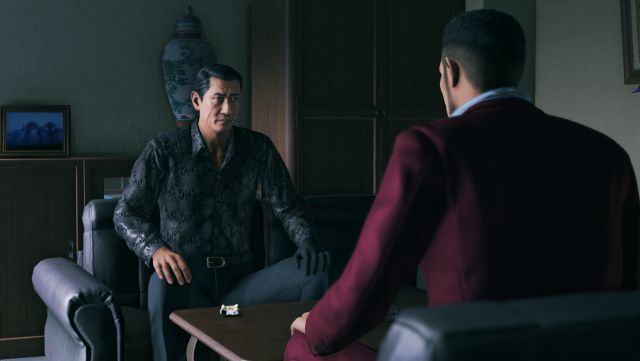
A fairly large map with a lot to do
As in all installments of the franchise, we will have a central open world map to explore and discover every nook and cranny. In this case, it is a fairly large map (more faithful to role-playing games than to the franchise) full of secrets and things to do, in which everything will be hidden until we explore to reveal all the stores and locations . It will be throughout that map where we will not find all the secondary missions that we mentioned before (always related to finding people with problems on the street and trying to help), but also the usual mini-games: restaurants of various kinds (to try to eat all in all and to regain health and magic), mahjong rooms, shogi, karaoke, Sega arcades (with the usual classics of Virtua Fighter, Hang On, Space Harrier …), and so on.
As it is a traditional role-playing game, the stores of objects and equipment could not be missed. On this occasion, in addition to the Poppo stores, vending machines and the usual pawnshops, we will also have specific equipment stores (weapons and armor), as well as a workshop to improve our equipment in various ways. The traditional combat arena and other common minor activities of the franchise will not be missing either. But the big focus in secondary activities revolves around three main focuses: business management, go-kart racing and part-time hero work.
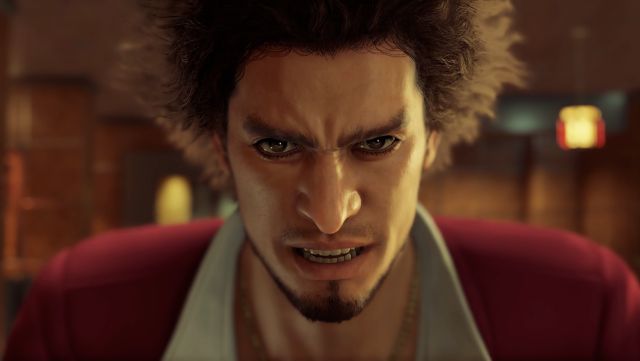
The business management is relatively similar to that seen in Yakuza 0, although much more direct (and with a considerably lower consumption of game hours). It’s about buying businesses, assigning workers to them, and upgrading them to get maximum benefits. Workers can go to the option of hiring or recruiting them on the street, the latter being the ones with the best statistics, although we will have to meet the requirements that they ask us to be able to get their services. From time to time, we will also have a shareholders meeting which is another minigame in which we will have to face the questions of people who are not very satisfied with our work. The ultimate goal is to become the number one company in the city and there is a whole subplot with rival companies, in addition to being able to get a character for the group and to fully develop our bond with her.
In a similar way, Dragon Kart is presented, with a subplot for being the best racer in the city. This minigame is a full-fledged Mario Kart or Sonic All-Stars Racing, with objects during the races and the possibility of modifying the kart to improve its statistics, so its four tournaments end up being very fun and varied, in addition to having the motivation inherent in its subplot. As for a part-time hero, it is about fulfilling dozens of missions based on saving people who want to beat up on the street or collecting objects that are more or less difficult to obtain. To all this we should add other minor activities such as taking professional training exams (with questions about very different areas), getting emblems of the Tojo clan hidden everywhere or getting all the Sujimon that, as a parody of Pokémon, will request a teacher that we get. Basically, it is about registering in the Sujidex all the possible types of enemies that we will encounter throughout the game.
The game is huge and has infinite possibilities, in such a way that, as in other installments, it is very easy to get lost for hours. And although the main map (and the one in which we will spend the most time) will be that of Isezaki Ijincho, we will also visit maps already known from previous installments (with some more mini-games that we already enjoyed in their original installments). As in previous chapters, this is one of the funniest parts of the game and both its variety of proposals and how fun they are help the hours fly by.
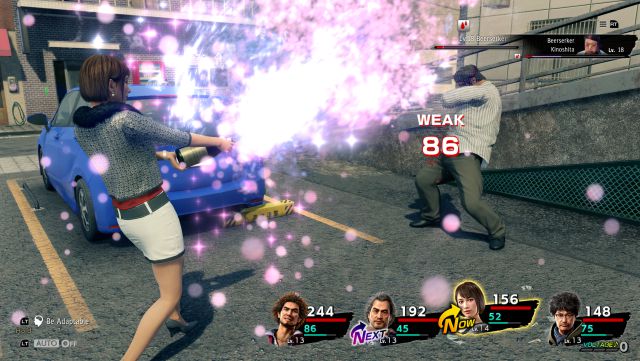
Traditional role
We have saved the most peculiar part of this game for last, which is its drastic change from an action RPG system to a traditional Japanese turn-based RPG system. This change is presented in a very original way, since it is proposed as a projection of Ichiban’s psyche and his dream of being a hero like when he plays Dragon Quest, which makes all the transformations, invocations and other pyrotechnics only be in your head. The combats are funny because of how parodic they are, especially with the system of jobs that, in this case, are literally jobs of the modern world: security, idol, dancer, office worker … We will have to go to the unemployment office to see what new jobs we are unlocking according to the requirements that we complete, up to a total of nineteen. All of them will have different ranges to improve them and learn new skills while improving our characteristics.
However, they end up getting a bit repetitive and, towards the end of the game, we will only start fighting when we need to level up. Nor does it help much that they are half-active combats and we have to, for example, press a button to defend ourselves from the rival attack or press a button to enhance our attacks. Especially in defense, the camera moves so much throughout the combat zone that sometimes we receive the blow without even having the opportunity to try to defend ourselves because the camera did not reach the place before the attack was completed, which can sometimes be somewhat frustrating. We are also not excited about the fact that objects on the map can no longer be freely picked up and that it is now up to the character to walk past one and decide to pick it up. Without being a bad combat system at all (it shows that it drinks a lot from Persona 5), it is without a doubt a point with room for improvement and that it does not finish taking advantage of the opportunities that are sensed. In a game that achieves excellence in many aspects, the limitations of this system are even more noticeable.
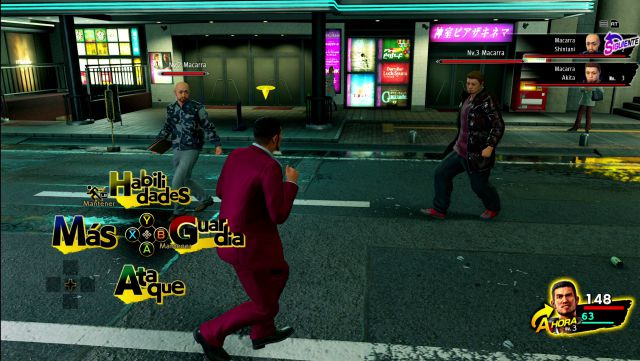
The whole traditional role-playing theme is conveyed well beyond this, either with the purchase of gear of various characteristics or with Kasuga’s various personality traits, both of which bring various possibilities the higher his level, whether at the time. to talk to characters on the map or to use certain skills. In the same way, the game now has traditional court dungeons (few, yes) in which we will go through rooms obtaining objects and treasures while we try to reach the final boss of each moment. In general, the fusion is perfect between what is the spirit of Yakuza, which remains unchanged, and a traditional role-playing game that does not hide without winks and direct references to greats of the genre such as Dragon Quest or Persona. All this, with its traditional mix of humor and drama.
What is especially interesting is how well everything is linked. As we saw in the last installments of the franchise, doing secondary activities contributes a lot to the main plot, since it allows us to improve the character in various aspects and facilitates the advancement generated in the game, either by getting money, special weapons , mercenaries (the invocations of the game), improving our personality attributes or, simply, helping us to level up in a more enjoyable way.
Technical section
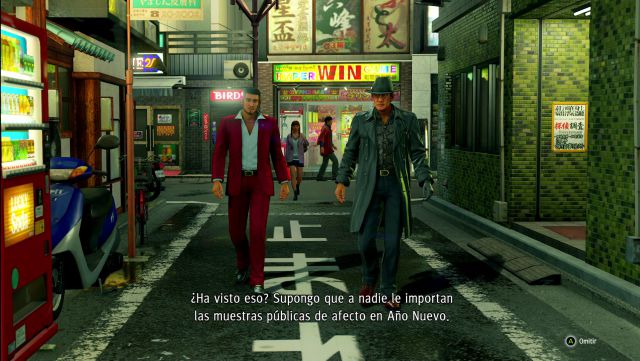
When it comes to the audiovisual finish, the study continues to show that the Dragon Engine can give many joys. Despite not having big surprises with respect to the last two installments (the game looks quite similar to Yakuza 6 and Yakuza Kiwami 2, especially at the level of graphic potential in video scenes), it is noticeable that little by little it They are picking up the tone to the engine to polish the defects that were in the previous games that used this engine. The open world is still fluid, the transition times in the game world are practically nil (except when loading specifically, where there are sometimes substantial loading times) and in general everything looks great, especially in the sequences of video.
Yes, it is true that sometimes the animations, within the game itself, can have moments of being little fluid (especially when the groupmates follow us, who move exactly the same and it is even parodic) and that there are some other bugs punctual, especially loading new scenarios if we move too fast. However, in general, the finish is an audiovisual joy, full of lights and with a lot of life on the screen at all times.
As far as Xbox Series X is concerned, the title stands out for being much more attractive than the current generation consoles. We are in a game that goes on horseback of both worlds, and it shows: it is not a 100% next gen game, but the improvements at a visual level, and especially fluidity thanks to the normal mode that allows 1440p and 60 frames per second are appreciated, as well as some improvements in lighting and details in general much cleaner. Awaiting a game only for Series and PS5, Yakuza: Like a Dragon on Xbox Series X looks like never before in the series. It also has a 4K and 30fps mode, but the improvement in details does not compensate for not being able to enjoy it at 60 frames per second.
CONCLUSION
Yakuza: Like a Dragon came to us with the great handicap of his legacy. After a large number of installments of increasing quality in which each game was better than the previous one, there were some fears of how to face a new story after the wonderful closure of Yakuza 6. However, the Ryu ga Gotoku Studio has shown us its capacity to tell epic and endearing stories alike, as well as to offer us charismatic and memorable characters. Kasuga sets himself up as a new hero to follow with a sprawling game, packed with things to do and possibilities, where it’s easy to get lost for hours while enjoying both the dramatic main story and the absurd humor of the secondary things. Without a doubt, one of the great games of this year and an ideal title to launch the new generation of consoles.
THE BEST
- The deep and elaborate plot, the characters and their motivations.
- The new important minigames, that hook with their plots.
- His wonderful sense of humor and constant parody.
- Surprises for fans of the franchise.
- Well implemented and dynamic turn-based system …
WORST
- … Although this combat system has its limitations
- Some animations and technical errors during the game.
Very good
A game with a remarkable finish that we will enjoy and remember. A good buy, highly recommended for lovers of the genre. It is well cared for at all levels.
